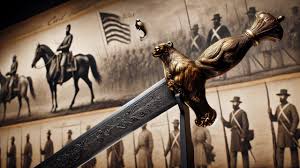The Honangen Sword is more than just a weapon; it is a symbol that carries deep historical, cultural, and spiritual significance. Known for its distinctive design and outstanding craftsmanship, this sword has captured the imagination of historians, martial artists, and collectors alike. In this comprehensive article, we will explore the origins of the Honangen Sword, its unique construction, role in warfare, and its lasting cultural legacy. Whether you are a sword enthusiast or simply curious about historical weapons, this guide will offer an insightful journey into the world of the Honangen Sword.
1. Introduction
The Honangen Sword stands out among medieval swords due to its distinctive double-edged blade and exquisite design. While it may not be as widely recognized as other famous swords like the katana or longsword, the Honangen Sword holds a respected place in the history of weaponry. It embodies the craftsmanship and valor of the warriors who wielded it, reflecting both practicality in battle and artistry in creation.
This article aims to introduce readers to the fascinating story behind the Honangen Sword, detailing its origins, design, and the significance it held in various cultures. We will also discuss how this sword continues to inspire modern-day martial artists and collectors.
2. Origins and Historical Background
The origins of the Honangen Sword trace back to medieval Europe, where it emerged as a favored weapon among the nobility and warrior classes. Some historians link the sword’s style to Scandinavian or Norse traditions, which valued both function and symbolic power in their weapons. The sword’s double-edged blade allowed it to be effective in both cutting and thrusting, making it versatile on the battlefield.
The Honangen Sword saw use during several historical periods, from Viking raids to the later medieval ages. It often represented not only the martial skill of its wielder but also their social status, sometimes being passed down as a treasured family heirloom. The sword was more than just a tool for combat—it was a marker of honor and loyalty.
3. Design and Craftsmanship
3.1 Blade Characteristics
The hallmark of the Honangen Sword is its double-edged blade, typically measuring between 70 and 90 centimeters in length. Unlike the curved blades of other swords, the Honangen’s straight and balanced blade made it suitable for a wide range of combat techniques. The blade was usually forged from high-carbon steel, which ensured both sharpness and durability.
The steel used in crafting the blade underwent a folding process. This technique involved repeatedly heating and hammering the steel to remove impurities and distribute carbon evenly throughout the blade. The result was a blade that could withstand the rigors of battle without breaking or dulling easily.
3.2 Hilt and Guard Design
The hilt of the Honangen Sword was designed for both practicality and comfort. It often featured a cross-shaped guard, providing excellent protection for the wielder’s hand during combat. The grip was typically wrapped in leather or wire to prevent slipping, and the pommel was sometimes decorated with carvings or insignia, reflecting the owner’s identity or rank.
The scabbard, usually made from lacquered wood, was both functional and decorative. It protected the blade when not in use and was often adorned with motifs or colors that indicated the sword’s origin or the status of its owner.
3.3 Forging Techniques
Forging a Honangen Sword was an art form that required masterful skill and knowledge. Swordsmiths employed various heat treatment processes, such as quenching and tempering, to give the blade the right balance of hardness and flexibility. After forging, the blade was polished meticulously to achieve a mirror-like surface, which not only enhanced its appearance but also helped prevent corrosion.
4. Cultural and Symbolic Significance
The Honangen Sword held more than military value—it was a cultural icon. In many societies, owning such a sword signified noble status and bravery. It was often used in ceremonies, such as knighting rituals or oath-taking ceremonies, where the sword symbolized commitment and honor.
Artistic representations of the Honangen Sword in tapestries, paintings, and sculptures underline its importance beyond the battlefield. It was viewed as a sacred object, sometimes believed to carry the spirit of the warrior who wielded it.
5. Role in Warfare
In combat, the Honangen Sword was prized for its adaptability. Its double-edged design allowed warriors to switch easily between slashing and thrusting attacks. The balance and length made it effective for close combat and mounted fighting alike.
Historical records mention the use of this sword in various battles, where its combination of speed, power, and precision often gave warriors an advantage. The sword’s design also enabled quick defensive maneuvers, making it a versatile weapon in the heat of battle.
6. Modern-Day Relevance
Today, the Honangen Sword continues to fascinate historians, martial artists, and collectors. Historical European Martial Arts (HEMA) practitioners study its design and techniques to revive ancient fighting styles. Museums worldwide showcase this sword as a testament to medieval craftsmanship and warrior culture.
Collectors prize authentic Honangen Swords for their rarity and beauty, while reenactors and educators use replicas to bring history to life. The sword serves as a bridge between past and present, inspiring appreciation for traditional skills and values.
7. Preservation and Maintenance
Maintaining a Honangen Sword requires careful attention to prevent rust and damage. Proper storage in a dry, climate-controlled environment is essential to protect the steel blade. Regular cleaning, oiling, and inspection help preserve the sword’s sharpness and appearance.
Antique swords often need professional restoration to repair wear or corrosion without compromising their historical integrity. This careful preservation ensures that the legacy of the Honangen Sword will continue for future generations to admire and study.
8. Comparisons with Other Swords
While the Honangen Sword shares similarities with other medieval swords, such as the longsword or arming sword, it has unique characteristics. Its double-edged, straight blade contrasts with the curved blades of other designs, offering different combat advantages.
The sword’s craftsmanship, ceremonial use, and symbolic meaning also distinguish it from more common battlefield swords. This uniqueness adds to the sword’s mystique and enduring appeal among enthusiasts.
| Feature | Honangen Sword | Typical Longsword | Katana |
|---|---|---|---|
| Blade | Double-edged, straight | Double-edged, sometimes curved | Single-edged, curved |
| Length | 70-90 cm | 85-110 cm | 60-80 cm |
| Hilt | Cross guard, leather-wrapped | Cross guard, leather-wrapped | Circular guard, wrapped grip |
| Cultural Origin | Medieval Europe/Scandinavia | Medieval Europe | Japan |
| Primary Use | Versatile in cut & thrust | Versatile in cut & thrust | Cutting, precision strikes |
9. Frequently Asked Questions (FAQs)
What materials were used in the Honangen Sword?
The blade was primarily forged from high-carbon steel, which was folded and heat-treated to increase strength and sharpness. The hilt often featured leather or wire wrappings for grip.
How does the Honangen Sword compare to other swords?
It stands out with its double-edged, straight blade, combining effectiveness in slashing and thrusting, unlike the curved or single-edged swords common in other cultures.
Is the Honangen Sword still used today?
While no longer a battlefield weapon, it remains important in historical study, martial arts, collections, and ceremonial contexts.
10. Conclusion
The Honangen Sword is a remarkable example of how function, artistry, and symbolism can merge into one extraordinary object. Its unique design and historical significance make it an enduring icon of craftsmanship and valor. From its origins on medieval battlefields to its respected place in modern collections and martial arts, the Honangen Sword continues to inspire admiration and respect.
Understanding this sword helps us appreciate not only the skill of the ancient swordsmiths but also the cultural values that shaped their world. The Honangen Sword is truly a timeless masterpiece—a symbol of honor, tradition, and excellence.
Other Articles
Rizeelyn: A Deep Dive into the Meaning, History, and Significance of a Beautiful Name
PHMHaven Complete Guide: Your Path to Physical, Mental & Holistic Wellness
7897894bet: The Ultimate Guide to Online Betting, Games, and Features
Bozmixsiw154: The Ultimate Guide to a Secure and Scalable Business Solution








